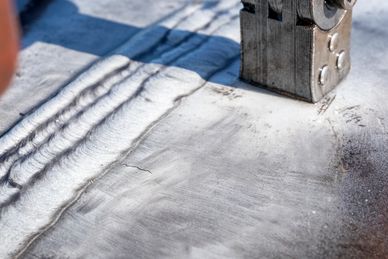Inland Diving & Marine Construction Services
What is the difference between ultrasonic testing and magnetic particle inspection?
What is the difference between ultrasonic testing and magnetic particle inspection?
What is the difference between ultrasonic testing and magnetic particle inspection?

- The difference between the two testing is: Ultrasonic Testing (UT) uses sound waves to detect internal flaws, suitable for various materials, while Magnetic Particle Inspection (MPI) relies on magnetism to find surface and near-surface cracks in ferromagnetic materials.
- Key differences: include the type of defect they can find (internal for UT, surface for MPI) and the materials they can test (various materials for UT, only ferromagnetic materials for MPI).
- Destructive testing (DT) : Evaluates material properties by breaking the sample, providing definitive mechanical data but destroying the item, while non-destructive testing (NDT) assesses materials and components without causing damage, allowing for continued use or repeated inspections. DT is crucial for design and manufacturing but is limited by its sample destruction and cost.
What materials can be tested?
What is the difference between ultrasonic testing and magnetic particle inspection?
What is the difference between ultrasonic testing and magnetic particle inspection?

- Materials tested with Ultrasonic testing(UT) : Metals include various steels, aluminum, nickel, and other metal alloys, where UT is particularly effective due to their dense, crystalline structure.
- Composite Materials(UT) : like carbon fiber and fiberglass are commonly inspected using ultrasonic testing to find delamination's and other internal defects.
- Plastics and Polymers (UT): These materials can also be tested, although the resolution may be reduced compared to metals due to higher sound wave attenuation.
- Ceramics (UT): Fired ceramics, such as those used in turbine blades and engine components, are suitable for ultrasonic testing for thickness gauging and flaw detection.
- Concrete (UT): Ultrasonic testing is also used to inspect concrete structures. Wood and Paper are generally not suitable.
- Materials that work best for Magnetic Particle Inspections (MPI) :
- Iron and its alloys: Steel is a common iron alloy used in many industries and is an excellent candidate for MPI.
- Cobalt and Nickel and their alloys: These metals are highly susceptible to magnetic fields and are suitable for MPI. Not suitable are Copper Alloy, Aluminum Alloy, Magnesium Alloy, and Zinc Alloys.
What is the testing process of both?
What is the difference between ultrasonic testing and magnetic particle inspection?

- How (UT) works: by sending high-frequency sound waves into a material with a transducer and couplant, such as gel or oil. These sound waves reflect off internal structures and discontinuities, such as cracks or voids, bouncing back to the transducer. By analyzing the time and amplitude of these returning echoes displayed on a screen, a technician can locate and characterize internal defects, measure material thickness, and assess structural integrity without damaging the part.
- Magnetic particle inspection (MPI) : Surface Preparation to clean the ferromagnetic part, Magnetization to create a magnetic field, Particle Application to introduce ferromagnetic particles that accumulate at defects, Inspection by a trained operator to locate and interpret the resulting indications, and finally Demagnetization to remove residual magnetism from the part. This non-destructive method is used to detect surface and near-surface flaws in materials like iron, nickel, and cobalt.
- Surface Preparation
- Magnetization
- Particle Application
- Inspection
- Demagnetization
How to know if your current project will benefit from this technology?

- Applications: Choosing between Ultrasonic Testing (UT) and Magnetic Particle Inspection (MPI) depends entirely on your project's specific requirements, as they detect different types of flaws in different materials. The best approach is to consider your project's material, the location of the potential defects, and your budget.
What are the limitations between ultrasonic testing and magnetic particle Inspection?
What are the limitations between ultrasonic testing and magnetic particle Inspection?

- limitations include: material properties, complex geometries, need for surface preparation and couplant, and high operator expertise. Magnetic Particle Inspection (MPI) limitations include its restriction to ferromagnetic materials (iron, steel), shallow detection depth, potential for messiness, and the need for electricity. UT is best for deep internal defects in various materials, while MPI is for surface/near-surface flaws in ferromagnetic materials. Asking one of our trained professionals to dive deeper into the limitations of your project is best.
Texas JDC Diving Inc. is the right choice for your UT & MPI
Advanced techniques & Training
Advanced techniques & Training
Advanced techniques & Training
- Texas JDC Diving Inc. capable of performing both subsea Ultrasonic Wall Thickness testing and Magnetic Particle testing using both wet and dry, visible or fluorescent mediums.
- Texas JDC Diving Inc. personnel are certified to Level II in several procedures, including Ultrasonic Wall Thickness testing and Magnetic Particle testing. They also hold certification as an ABS (American Bureau of Shipping) External Specialist for underwater visual examination.
Comprehensive NDT capabilities
Advanced techniques & Training
Advanced techniques & Training
- Texas JDC Diving Inc. is presented as a strong choice for ultrasonic testing (UT) and magnetic particle inspections (MPI) based on its extensive experience, certified personnel, robust safety culture, and comprehensive service offerings as a full-service contractor.
In summary, if you are looking for underwater Ultrasonic Testing and or Magnetic Particle Inspections, Texas JDC Diving Inc. is explicitly qualified to perform all these services based on:
Training and Expertise
Advanced techniques & Training
Training and Expertise
- In-house training: At Texas JDC Diving Inc. we provide in-house / hands on training from the highest level veterans of the commercial diving industry.
- Experienced teams: As a commercial diving company, we operate in high-risk situations and require only the highest trained and more experienced personnel to provide you with optimal performance and satisfaction.
Inland Diving & Marine Construction Services
Gallery
Inland Diving & Marine Construction and More

Routine Inspections of Underwater Structures
Clarifiers, Aeration Tanks, Pipelines

Cleaning to remove Debris, Sediment, Biofilms from equipment
Screen, Intakes, Submerged Machinery

Non-destructive Testing (NDT)
Ultrasonic Testing and Magnetic particle Inspection
Surface Impoundment Dredging, Excavation and Materials Reduction (Belt press and centrifuges)







Cleaning to remove Debris, Sediment, Biofilms from equipment (Screen, Intakes, Submerged Machinery)






Routine Inspections of Underwater Structures






Texas JDC Diving Inc.
Precision below, confidence above